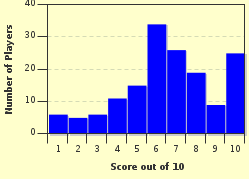Quiz Answer Key and Fun Facts
1. For which U.S. federal agency did John Dean work before he was hired as the White House counsel?
2. Which powerful man was John Dean's supervisor in the White House from July 1970 to April 1973?
3. The Watergate break-in took place on June 17, 1972. Where was John Dean when the burglars were caught and arrested?
4. During the summer of 1972, John Dean played a major role in the White House's attempts to cover up its involvement in the Watergate burglary. Which of these statements best describes Dean's activity during this time?
5. During the summer of 1972, John Dean handed over sensitive White House documents to L. Patrick Gray. For which federal agency did Gray work?
6. After the Nixon election victory in November 1972, which Watergate defendant put the most pressure on John Dean to receive "hush money"?
7. What happened to John Dean on April 30, 1973?
8. In June 1973, John Dean testified for a week in front of a U.S. Senate committee headed by Sam Ervin. What bombshell piece of information did Dean reveal to Senator Lowell Weicker?
9. For which Watergate-related crime was John Dean convicted?
10. What is the name of the 1976 book which John Dean wrote about his White House experience?
Source: Author
mrgrouchy
This quiz was reviewed by FunTrivia editor
ladymacb29 before going online.
Any errors found in FunTrivia content are routinely corrected through our feedback system.

